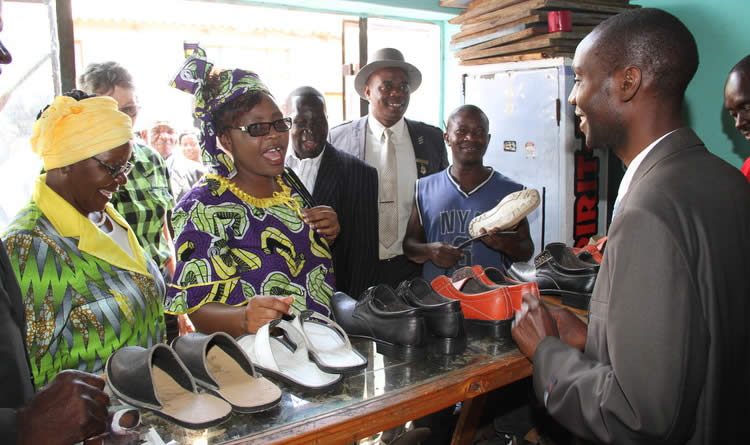New era dawns for SMEs


Patrick Muchemwa (far right) shows Small and Medium Enterprises and Co-operative Development Minister Cde Sithembiso Nyoni (far left) and Minister of State for Harare Province Cde Mirriam Chikukwa (centre) some of the shoes manufactured at the BEST Co-operative complex
Roselyn Sachiti Features Editor
“For many years, I sold vegetables and fruits from a small roadside stall in Magaba area. That place was home for almost all my life. “When Operation Murambatsvina came, I thought my end had come since my source of livelihood had been pulled off my feet. Today I only realise that it was a blessing in disguise as it helped me and many others regularise my operations.”
This are words by 62-year-old Susan Mahamati of Mbare , who is a member of BEST, a co-operative that operates near the popular Siya So home industry in Mbare.
Mahamati is one of 56 members of the co-operative who own 99 cubicles built on a piece of land allocated to them by council. Members comprise 27 women and 29 men.
Today, they all earn a living from rentals they collect from the 43 cubicles they lease to other business people. They are an example of how co-operatives can be successful if well managed.
They are also evidence of how a good relationship between Government, local authorities and small to medium entrepreneurs can yield positive results.
BEST Co-operative chairperson Mr Jeshua Mubvekeri said they started operating as a group in 1996.
In 2005, Operation Murambatsvina came and they were evicted from the spots they operated illegally from.
This pushed them to form a group and regularise their operations.
By 2006, they had done all the paperwork ensuring that the City of Harare would take them seriously.
Their dream came true. The City of Harare leased them land where they built their first structures using resources they had pooled together.
Their first steps were not easy. Lines of credit were never available as they were considered a risk by banks and other financial institutions.
“Our members would sell their wares including vegetables and fruits to buy cement and other building materials. We did not have any collateral back then and this resulted in banks refusing to give us loans.
“It was not easy. Sanctions and the Zimbabwean dollar, then the introduction of the United States dollar made everything tougher. We also came across people who told our members that they should be careful as we might fleece them,” said Mr Mubvekeri.
Because of hard work and determination, they built their first block which had 20 units in 2006, he said.
“We can now compete with established property developers to build business premises. Our aim now is to build schools and houses. Some of our members have cubicles but no houses of their own,” said Mr Mubvekeri.
Their next step now, he said, is to buy the land from council.
“We have proved to council that we can do it. We do not owe them a single cent in terms of water bills,” he said.
At BEST activities that include welding, carpentry, takeaways, shops, hardwares among others are sustaining the lives of many.
Their activities are also enunciated in the country’s economic blueprint, the Zimbabwe Agenda for Socio-Economic Transformation (ZimAsset).
Their operations have also excited both Government and local authorities and are a perfect case study for many aspiring SMEs and co-operatives.
Principal Director in the Ministry of Local Government and National Housing Mrs Erica Jones said what BEST Co-operative has done gives dignity to co-operatives.
“I am used to people hammering and welding under a tree. At BEST, there is a lot of diversity as there are small businesses making peanut butter, some engineering and manufacturing. They have shown perseverance and that if self sufficient, people do not need donors. I am happy that they have transformed from an informal to formal sector,” she said.
Illegal vending is a major challenge in Zimbabwe, especially the capital Harare.
Government is not just folding its hands. There are big plans to bring order to the streets in a way that does not leave people without a source of income.
Minister of Local Government, Public works and National Housing Dr Ignatious Chombo agrees that SMEs comprising the informal sector employ the largest number of people and are a major source of revenue at household level.
He said one of his ministry’s aspirations is to complement efforts in transforming the informal sector into a pillar of economic growth whose contribution to the Gross Domestic Product is fully recognised and facilitated.
“My ministry, through the 92 local authorities, should take audacious steps in facilitating the informal sector so that it becomes a viable sector capable of transforming the fortunes of our economy as happened in India.
“I am also desirous to see the progression of our current small and medium enterprises into large operations which contribute not only to the national economy but also to employment creation and the development of further opportunities for new SMEs,” he explained.
He suggested that local authorities should not start thinking outside the box and explore and establish innovative legal frameworks that seek to expand opportunities and space for the operations of the informal sector.
“Existing ideas such as facilitating weekend and evening street markets and car boot sales, the construction of factory shells and the holding of expos should be adapted and adopted and new ideas should be tried out,” he proposed.
He added that council should consider creating space previously not considered for small businesses.
“The introduction of mobile pushcarts vending where traders literally follow the market could create additional opportunities although there would have to be special controls for road safety purposes. Such vendors could be required to have a rubbish receptacle on their carts to discourage littering,” he said.
Local authorities, Dr Chombo said, could transform street islands into market space and users would be tasked with the maintenance of the greenery often associated with same.
“The aesthetics of island markets could be enhanced by the use of fold away vending tables and coloured umbrellas. The use of fold away tables would in turn create a new industry for carpenters,” he recommended.
Another innovation, according to Dr Chombo, would be to create gaps in existing precast walls surrounding many amenities and allow vending through the gaps.
“This would replace the durawall with a vending wall. As most amenities are strategically placed, vending from such spaces would be lucrative but at the same time would not hinder the flow of human traffic along the sidewalks,” added Dr Chombo.
He said local authorities should move from colonial thinking with regards to the informal sector.
“The resilience shown by this sector during these tough times is beyond question and that it is a vital component of Zimbabwean life and plays an immense role in supporting our citizens should never be forgotten. We need to change our thinking, planning and by laws to encourage and promote the informal sector just as we do the formal sector.”
He said the informal sector should uphold societal norms by ensuring that uncouth behaviour such as touting and harassment of the public, littering and operating in undesignated spaces is completely eradicated and any licenses or rentals are paid on time.
He also added that the hostility existing between local authorities and the informal sector worries him as it comes from lack of common understanding and shared vision.
“The informal sector should organise themselves into officially recognised associations that serve as a platform to amicably interact with central and local government agencies to come up with initiatives in the conduct of business in an environmentally friendly manner as opposed to being confrontational.
“They should co-operate with Government and municipal agents by not only abiding with municipal regulations and by-laws, but also assisting in a type of peer policing where those who flout the rules are corrected by their colleagues for the benefit of the entire informal sector,” he said.
Small and Medium Enterprises and Co-operative Development Minister Sithembiso Nyoni said Zimbabweans should move from the notion of thinking that co-operatives are dead and do not work.
Government though her ministry, she revealed, put in place a policy framework to guide and engender the provision of appropriate infrastructure for SMEs.
“The policy is responding to the ever growing demand for appropriate workspace given the exponential rise in the numbers engaged in the SMEs sector,” she said.
Between March and April 2011, her ministry conducted a survey which revealed that at least 6 216 informal traders are operating along the streets of Harare and have no infrastructure and the figure could have ballooned two to three times.
She said the policy aims at strengthening the collaboration and co-ordination of Government ministries, local authorities and other development partners in the provision of affordable infrastructure for SMEs.
It also hopes to formalise and create sustainable growth for SMEs through infrastructure provision.
The policy, Minister Nyoni said, also encourages the participatory approach that entails a broad consultation and involvement of all stakeholders as far as infrastructure provision is concerned.
She also emphasised the need for a win-win situation among beneficiaries and benefactors in infrastructure provision.
“The policy framework encourages Private Public Partnerships such as Build, Operate and Transfers (BOTs) that local authorities would get into and construct the infrastructure and lease out to MSMEs,” she added.
She said local authorities should upscale the provision of space for infrastructure development such as factory shells, market malls and stalls, common service facilities, farm produce wholesale markets and flea markets among others.
“Local authorities should set aside revenue they are collecting from occupied space for infrastructure development. Some local authorities just choose a spot and draw a square using white chalk and tell people that they will work from there. There is usually no shed, water, toilet or protection yet council collects a dollar from that square every day.
“What is that money doing? Money should be given in exchange of good service. If you collect money, use part of that dollar to build shelter,” she said.
Feedback: [email protected].









Comments